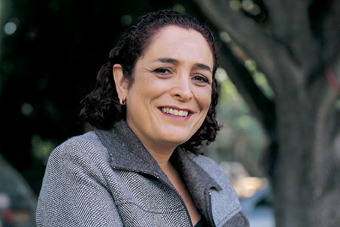One of the characteristics of cancer cells is their refusal to die. In chronic lymphocytic leukemia (CLL), a blood cancer, white blood cells called B lymphocytes, or B cells, lose the internal self-destruct program for limiting their lifespan. Instead of maintaining a steady turnover in the blood, their numbers continue to grow, building up to dangerous levels in the blood, bone marrow and lymph nodes.
A team of scientists headed by Prof. Idit Shachar of the Weizmann Institute’s Immunology Department and Dr. Michal Haran of the Kaplan Medical Center’s Hematology Institute recently discovered what keeps CLL cells alive. This survival mechanism, they found, is vulnerable to attack by antibodies that target it, causing the cancer cells to die. Their findings, which appeared recently in Proceedings of the National Academy of Sciences (PNAS), USA, may lead to future treatments for this disease, as well as for other diseases in which B lymphocytes accumulate in the blood.
The short life of a B cell involves an intricate give and take between the self-destruct mechanism and other factors that keep the cell alive. In previous research, Shachar had found that a specific receptor – a protein on the outer surface of healthy B cells – plays a vital role in helping the cells survive. She wondered if the same protein might also be a central player in the abnormally high survival rates of cancerous B cells.
Members of Shachar’s research team, including Inbal Binsky, Diana Starlets, Yael Gore and Frida Lantner, together with Kaplan Medical Center doctors Haran, Lev Shvidel, Prof. Alan Berrebi and Nurit Harpaz; as well as scientists from Yale University and David Goldenberg of the Garden State Cancer Center in New Jersey, examined B cells taken from CLL patients. They discovered that even in the earliest stages of the disease, these cells have an unusually high level of this survival receptor. The scientists found that the act of protein binding to the receptor initiates a series of events within the cell that results in enhanced cell survival. One of the substances produced in this chain of events helps to regulate the cell’s lifespan, resulting in the maintenance of cell survival.
The team treated the CLL cells with an antibody that recognizes the survival receptor, blocking its activity and causing the cancer cell death rate to soar.
The antibodies they used are produced by the firm Immunomedics, in New Jersey, and are currently entering clinical trials for the treatment of several different types of cancer. Following this research, which has revealed the mechanism of the antibody’s actions, the company is planning trials for CLL as well.
Shachar: “The abnormally elevated levels of this receptor seem to be important factors in the development of this disease, right from the beginning, and they are responsible for the longevity of these cancerous B cells. Blocking the receptor or other stages in the pathway they activate might be a winning tactic, in the future, in the war against cancers involving B cells.”
Prof. Idit Shachar’s research is supported by the Kirk Center for Childhood Cancer and Immunological Disorders; the Weizmann Institute of Science-Yale Exchange Program; the Abisch Frenkel Foundation for the Promotion of Life Sciences; and the Phyllis and Joseph Gurwin Fund for Scientific Advancement. Prof. Shachar is the incumbent of the Dr. Morton and Anne Kleiman Professorial Chair.
